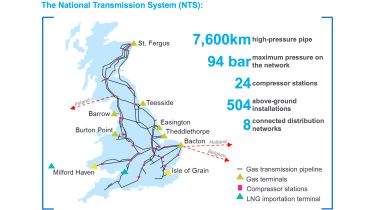UK hydrogen fuel stations to be supplied via the natural gas grid in new trial
Gas companies want to mix hydrogen into the natural gas grid, then ‘deblend’ it locally to supply a network of hydrogen fuel stations

As heavy goods vehicle manufacturers and car makers including Toyota and BMW continue to develop green hydrogen fuel-cell powertrains, a new trial aims to determine whether the natural gas grid can be used to efficiently transport hydrogen to filling stations around the UK. The use of existing infrastructure offers clear cost savings and could drive growth in the UK's hydrogen fuel network, potentially making hydrogen cars more viable in the longer term.
The UK’s National Transmission System (NTS) for natural gas extends across the majority of the country, and equipment capable of injecting hydrogen gas into the pipelines has already been developed. It has also been determined that the NTS can safely carry a blend of natural gas containing up to 20 per cent low carbon hydrogen, as gas companies and the government look to save millions of tons of C02 emissions from domestic heating boilers that are in future likely to run on a mix of fossil-fuel gas and low carbon Hydrogen. The low carbon hydrogen would be produced from renewable sources including wind power and nuclear (green hydrogen), but also from fossil fuels using carbon capture technology (blue hydrogen).
According to leading UK hydrogen infrastructure company Element 2, the ‘real world trial’ stage of the ‘HyNTS Deblending for Transport Applications’ project will create a fully functioning de-blending and refuelling facility, to showcase how grid-extracted hydrogen can be purified, stored and used for heavy transport refuelling. If successful, it could greatly simplify the logistical problems around transporting the gas in tankers to where it will be needed as a road fuel, while potentially making significant cost savings.
As one of the partners in the HyNTS consortium, which is bankrolled by UK energy regulator OFGEM’s Strategic Innovation Fund, Element 2 explained: “Transporting gaseous hydrogen via tankers to hydrogen refuelling stations is expensive over longer distances. Pipeline transmission provides an effective, economic and safe alternative, whilst also keeping road traffic and transport CO2 emissions down. The aim of HyNTS is to prove that this is viable from both a technical and economic perspective, unlocking the potential of nationwide distribution network for hydrogen.”
One process for de-blending Hydrogen from natural gas - itself mostly composed of Methane - has been pioneered by the University of Birmingham, using palladium alloy membranes that allow small Hydrogen molecules to filter through but won’t let larger methane molecules pass.
What do you think the future holds for hydrogen cars in the UK? Let us know in the comments...



